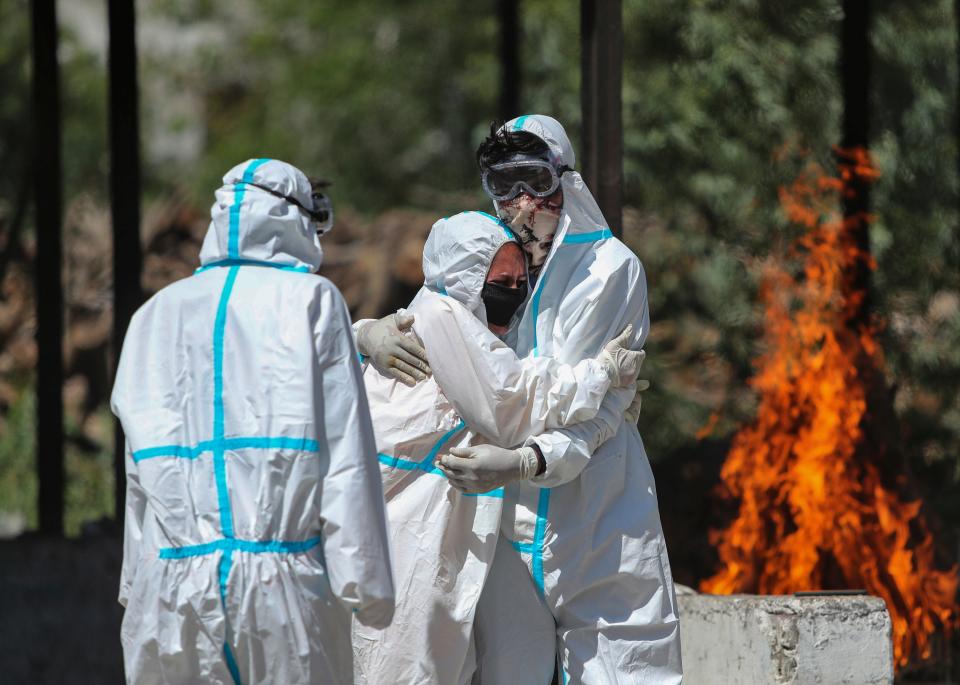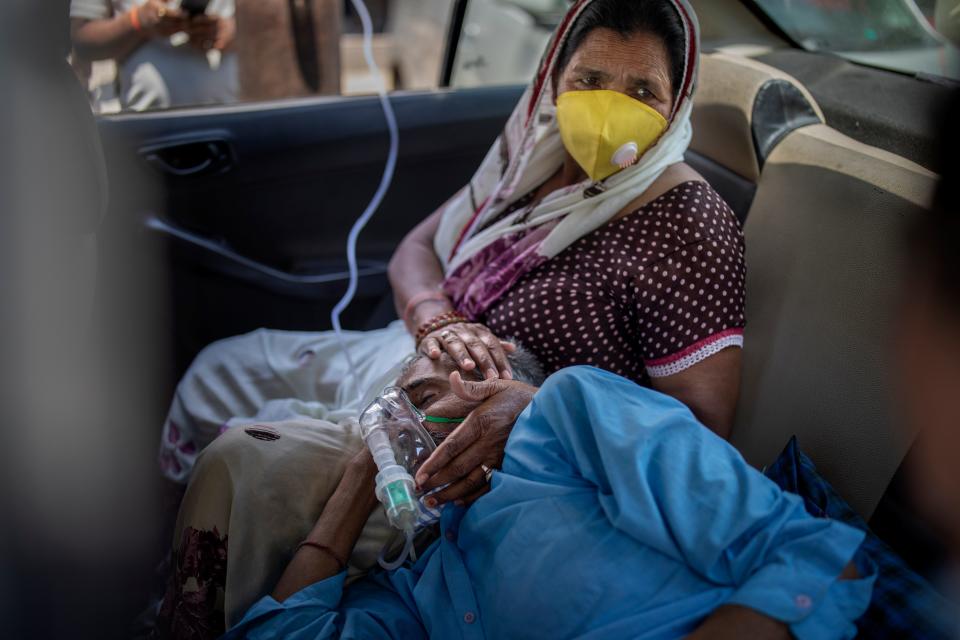'Apocalyptic' second wave of COVID-19 in India leaves families hunting for oxygen
KOLKATA, India – Ojasvi Bhatia knew he was on the clock Friday as waited in line to fill his oxygen canisters at a facility southwest of India's capital city, New Delhi.
His 61-year-old mother was admitted in critical condition to a hospital about 12 miles away in Gurgaon, and he was running out of time to get back to her with oxygen.
"In the morning I was told by the hospital that only 90 minutes' oxygen supply is left. Since then we are running about and trying to arrange it ourselves," he said standing outside a medical oxygen refilling facility. "We could manage an empty cylinder hoping to refill it here."
Bhatia said he had not yet been allowed inside the facility to fill up.
"Time is ticking. We are hoping we will get it and be able to save my mother," he said.
India reported 386,000 new COVID-19 cases Friday – a global daily record. Hospitals are running out of beds. Crematoriums are burning bodies through the night. With oxygen in short supply at medical facilities, patients are gasping for breath, and their families – overwhelmed by grief and helplessness – are running frantically to obtain oxygen themselves.
Indian Americans: Families watch, worry from 8,000 miles away
Biden: U.S. restricts travel from India

In Kolkata, the capital of West Bengal state in eastern India, Priyam Mallick is grieving the loss of her mother while trying to figure out how to break the news to her father, a heart patient who is also recovering from COVID-19. He was recently released from the hospital but remains weak with a low pulse, she said.
"I do not know how to break the news of my mom's death to him. I fear he might have an attack again hearing the news," Mallick said.
Mallick said her elderly parents largely stayed home during the pandemic but both tested positive in April. Mallick, who lives at her in-law's home with her husband and six-month-old daughter, said she was not able to visit her sick parents.
"As their condition worsened, both had to be admitted in different hospitals," Mallick said. "It was not easy to find a bed, and there was no ICU bed available for my mother. who was on oxygen support. The hospital gave her oxygen, but she succumbed finally."

'This time, almost everyone is affected'
Doctors, armed with limited resources, say the second wave of infections hit so hard that they are struggling to cope with its magnitude.
"It is a very grim situation for everyone, from patients to doctors and health workers," said Viny Kantroo, an infectious diseases specialist at New Delhi's Apollo Indraprastha Hospital. "This time almost everyone is affected in every family, and so they cannot even take care of each other at home or even cook their food."
Kantroo said many patients need oxygen and respiratory support.
"If some 15- to 25% of those getting infected need it, then it becomes a huge number. We have augmented our ICUs, but even that is not enough for this inflow of patients," she said.
Kantroo said she's not just facing a shortage of medical equipment – the healthcare system also needs more people trained in how to operate the equipment.
"We have a crisis of trained health workers and nurses, too, since it takes at least six months to one year to get proper training," Kantroo said.
In Mumbai, respiratory physician Dr. Sujeet Rajan has been working 16 hours a day, seven days a week for six weeks now at two hospitals, Bhatia Hospital and Bombay Hospital Institute of Medical Sciences. His two children living at home haven't stepped out of the house in a month and half. The streets are so empty, his commute now takes less than half the time.
"It's a very difficult time," Rajan said early Saturday morning before heading to the COVID ward. "It is important to understand that every physician in this country is stretching themselves . . . We’ve never had this kind of work."
Rajan said he had a minor surgery three weeks ago at a small nursing home "because the hospital was swamped." He said he sees dozens of patients a day and is taking on additional online consults when he gets home.
"There are people sometimes crying on the phone, 'please, please schedule an appointment. We can’t contact our general practioner and we don’t want to go to the hospital. We are scared someone else will get COVID,'" Rajan said. "It does become tough."
While his hospital has had access to oxygen, Rajan said he's seeing Mumbai's wealthy hoard oxygen cylinders.
Pilgrimages and political rallies
Infectious disease experts say a combination of political, biological, behavioral and meteorological factors fueled the current outbreak. The surge comes on the heels of a "super-spreader" pilgrimage along the Ganges River and a series of political rallies leading up to recent assembly elections.
India's surge: Crushing COVID-19 caseload the result of a 'perfect storm' of factors, experts say
In West Bengal, which is turning out to be the new ground zero of infections, tens of thousands of people attended rallies. On Thursday, the state added over 17,000 cases, bringing its total to nearly 800,000 since the pandemic broke.
Officially, West Bengal has reported 11,248 deaths, and India as a whole has reported more than 208,000 deaths. But experts suspect government tallies mask the true extent of the suffering.
As the death toll continues to mount, anger directed at the government of Prime Minister Narendra Modi is overflowing on social media. Earlier this week, a high court in the South Indian state of Tamil Nadu ruled members of the nation's Election Commission should face murder charges for allowing large political rallies to take place and feed the now-exponential spread.
The devastating second wave has also stalled the nation's vaccination campaign. India is the largest producer of vaccine and has vaccinated more than 15 million of its 1.4 billion residents so far.
Subhra Priyadarshini, chief editor of Nature India, an online research publication on science and medicine, said anger is growing because the pandemic is affecting each and every household in India.
"The second wave is apocalyptic to say the least. But should we be surprised? Some models had predicted it long back," she said. "We tried to play down a crisis and data and information coverup got precedence over hard scientific evidence as virologists, epidemiologists and modelers were shut out of the conversation."
COVID-19 updates: 100M Americans have received two doses or one J&J shot
Contributing: Grace Hauck
This article originally appeared on USA TODAY: India COVID-19 crisis: Oxygen scarce, bodies burning through the night
